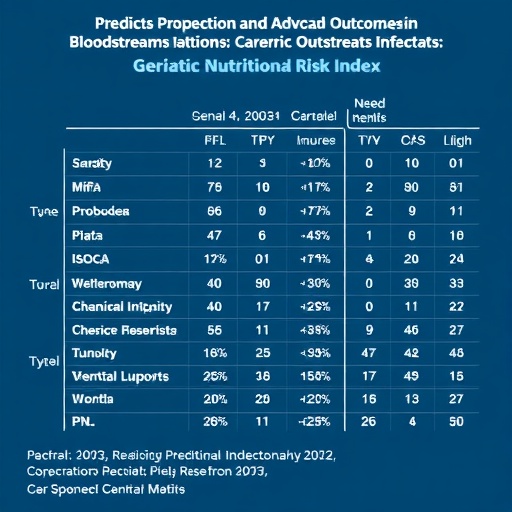In a remarkable exploration of the medical field, a retrospective study sheds light on a vital metric that could significantly influence the outcomes for patients suffering from bloodstream infections. This research, conducted by a group of esteemed scientists, underscores the importance of nutritional status in the elderly population, serving as a critical trigger for further investigations in geriatric medicine. The Geriatric Nutritional Risk Index (GNRI) has surfaced as a crucial tool that not only aids in assessing the nutritional status of older adults but also acts as a predictor of healthcare outcomes.
The study meticulously analyzed data from a diverse cohort of elderly patients diagnosed with bloodstream infections, a condition with alarming implications that often leads to severe complications, prolonged hospital stays, and increased mortality rates. The researchers painstakingly documented patients’ GNRI scores alongside vital health outcomes, thereby establishing a link between nutritional risks and the prognosis of those battling such infections. This effort not only emphasizes the role of comprehensive care approaches in geriatric patients but also stresses the urgency of integrating nutritional assessment in routine clinical practice.
Bloodstream infections represent a major health concern, especially in geriatric populations. The prevalence of these infections necessitates the need for clinicians to identify predictive factors that could inform treatment nuances. By focusing on the GNRI, the researchers revealed important findings that link poor nutritional status with higher likelihoods of adverse outcomes. This connection paves the way for using nutritional interventions as a potential strategy for improving healthcare management in vulnerable older patients.
Nutritional deficiencies among older adults are not uncommon; factors such as reduced appetite, cognitive decline, and social isolation contribute to an increased risk of malnutrition. Therefore, addressing these deficiencies is not merely a supplementary component of patient care; it is fundamental. The GNRI is especially significant as it provides an easily applicable metric that can be regularly monitored, allowing for timely adjustments to patient care plans. This study illustrates how optimizing nutritional intake may bolster immune responses and overall health status in patients confronting the serious ramifications of bloodstream infections.
Within the cohort examined, patients were categorized based on their GNRI scores, with a stark contrast observed between those classified as low-risk versus high-risk. The data revealed that higher GNRI scores corresponded with more favorable outcomes, including shorter hospital stays and lower rates of post-infection complications. These revelations are critical, as they suggest that healthcare providers should consider implementing regular nutritional assessments as part of their routine practice.
Moreover, the findings advocate for a multidisciplinary approach to managing geriatric patients with infections. Collaborating with dietitians and nutrition specialists empowers healthcare teams to create individualized care plans that effectively address nutritional risks. The integration of nutritional strategies into overall treatment plans for elderly patients could enhance recovery trajectories, ensuring that minor deficiencies do not become major obstacles in the battle against infections.
The implications of this study transcend the immediate context and reach into broader realms of public health and clinical practice. Not only does it underscore the need for proactive nutritional interventions, but it also prompts healthcare policymakers to consider strategies that promote nutritional health among aging populations. As healthcare systems continue to adapt to the needs of growing elderly populations, understanding the finite interplay between nutrition and illness will be paramount.
Research in the interplay between nutrition and health outcomes is not new but acquiring concrete evidence through robust studies such as this one is invaluable. The establishment of definitive benchmarks, like GNRI, can serve as guiding principles for future research endeavors, proposing that nutritional evaluations should be a standard procedure in the care of elderly patients with infectious diseases.
In addition to enhancing patient outcomes, the economic ramifications of better nutritional management cannot be overlooked. Reducing hospital stays through effective nutritional interventions positively influences healthcare costs, making a compelling case for healthcare systems to invest in nutritional screening and strategies for older patients. This realization stands as a critical component in ongoing discussions regarding healthcare reform and resource allocation.
The findings from this retrospective study undoubtedly contribute to the existing body of knowledge, further igniting conversations about the essential role of nutrition in the well-being of the elderly. As researchers continue to peel back the layers of this relationship, it becomes increasingly clear that harnessing the power of nutritional data can lead to improved health outcomes for a population greatly impacted by both infectious diseases and nutritional deficits.
This urgent call to action aims not only to inspire significant changes in individual patient care practices but also to advocate for structural changes within healthcare systems to prioritize nutrition in geriatric care. As the medical community responds to the challenges posed by aging populations, these research findings could become a cornerstone of efforts to enhance patient survival, quality of life, and broader health system efficiency.
In conclusion, as evidence mounts to solidify the role of nutrition in the treatment of infections among elderly patients, healthcare providers are encouraged to make this aspect a focal point in their practices. The pioneering research featured in this study is not merely an academic exercise; it is a clarion call for vital changes in approach, policy, and practice that could potentially save lives in one of the most vulnerable segments of our population.
Subject of Research: The role of Geriatric Nutritional Risk Index in predicting adverse outcomes in patients with bloodstream infections.
Article Title: The role of Geriatric Nutritional Risk Index in predicting adverse outcomes in patients with bloodstream infections: a retrospective study.
Article References:
Li, XL., Yu, ZH., Zhou, WH. et al. The role of Geriatric Nutritional Risk Index in predicting adverse outcomes in patients with bloodstream infections: a retrospective study.
BMC Geriatr 25, 754 (2025). https://doi.org/10.1186/s12877-025-06387-6
Image Credits: AI Generated
DOI: 10.1186/s12877-025-06387-6
Keywords: Geriatrics, Nutritional Risk Index, Bloodstream Infections, Elderly Patients, Adverse Outcomes.




